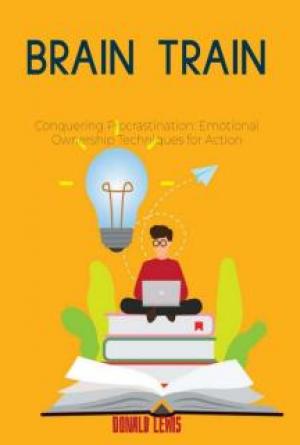
How to be Successful
A Guide to Achievement
Adam Cuthbertson
How to be Successful
Contents
Page
2 Chapter 1
Introduction
4 Chapter 2
Your Brain
5 Chapter 3
Your Potential
6 Chapter 4
Essential Qualities
9 Chapter 5
Other Desirable Ingredients
12 Chapter 6
The Enemies of Success
14 Chapter 7
Preparing for Success
18 Chapter 8
Personality
20 Chapter 9
Your Beliefs
21 Chapter 10
Getting Information, Guidance and Help
22 Chapter 11
Action
23 Chapter 12
Conclusion
Copyright Adam Cuthbertson 2015
How to be Successful
Chapter 1
Introduction
When we see someone we consider to be successful, we tend to think he
knows something that we don't. We can
see books advertised that offer to tell us the secrets of success. On the Internet, courses are offered that
will tell us what these secrets are.
After we have read these books or taken the courses, we don't seem to be
any wiser. The fact is thst there are no
secrets. Being successful is the same
procedure as doing anything else.
Suppose someone wished to learn to drive a car. The first step would be to acquire the
necessary knowledge. This would amount
to learning the controls of the car and the rules of the road. After this, the next stage would be to put
that knowledge into effect and practice driving. Assuming these two steps were
adequately covered, that person would become a driver.
The purpose of this book is to provide the information required for
success and it is then up to the reader to take the necessary action.
You may read this book and never take any action. That would be a pity since you have much to
gain by being more successful. Think of
the times each day when you use time and energy performing mundane and
meaningless tasks. Why not use this time
and energy to improve things for yourself?
Take this book seriously and make the attempt to improve your life. You may just find that it is worth the effort
to make a few minor improvements to make your life better. Remember, you have only one life, so why not
make the effort. This book has been
written to assist you, no matter what your aims are.
How to be Successful
Introduction
The language in this book has been kept simple and there are no
technical terms: therefore, there should be no problem understanding everything
the book teaches.
To be successful, we have to concentrate on three areas:
1)
Your thoughts.
2)
Your actions.
3) Your beliefs.
These are of equal importance, and should be treated accordingly.
"We achieve everything by our
efforts alone. Our fate is not decided
by an almight God. We decide our own
fate by our actions. You have to gain
mastery over yourself ... It is not a
matter of sitting back and accepting."
Daw Aung San K
How to be Successful
Chapter 2
Your Brain
When we are born, we are given the most powerful asset that we will ever
receive in life. That asset is our
brain. How we use it will determine the
life we have. You may find it difficult
to accept, but the life you have now, is a culmination of all your thoughts and
beliefs in the past.
You will probably have no trouble in accepting that it was your good
thinking that gave you your success in the past. However, you will probably blame unfortunate
circumstances or other people for your failures. No matter how it appears, you are solely
responsible for the life you have now and your future will be determined by how
you think and act now and in the future.
As we go through life, information is passed to the brain via our senses
- taste, sight, touch, smell and hearing.
Unfortunatly, much of the information passed is wrong or flawed. The result is that our conscious and
subconscious minds act on the information received and if this is wrong, we
suffer the wrong circumstances.We cannot filter all information passed to the
brain, much of which occurs without our awareness. However, we can monitor what we think and
determine as far as we can, if what we think is correct.
It has been proved that people use only a small percentage of their
brainpower. Thereforethere is plenty of
scope for improvement for us all.
The brain is the same as other parts of the body in one respect - it
functions better with excercise. In a
later, suggestions are given regarding exercising the brain and
imagination.
How to be Successful
Chapter 3
Your Potential
The
first thing we have to decide is whether or not you are capable of being
successful. Do you have the necessary qualities for greater achievements? Unfortunately, it is the practice of most
people to underrate themselves. They
achieve so much and decide, consciously or subconsciously, that they cannot go
any further.
For
example, they attend school and learn to read, write, count, etc. They may not gain any prizes, but they were
successful in mastering these subjects.
They, then, obtain a job which they manage to do satisfactorily. So once again they are successful. However, if the job supplies them with an
adequate income, this is as far as they go.
They make no further attempt to inprove themselves.
The
fact is that everyone, without exception, has had some success in life. On that basis, this book should have had the
title, "How to be More Successful".
Hopefully, the foregoing has convinced you that you have had successes
in life. If you take a few moments to go
over your past life, you will no doubt find other instances of success. This is important, since a feeling of
self-confidence is required to be successful.
Most
people have a feeling that they are capable of greater things. This feeling is true. We are all capable of more and greater accom
-plishments. You are no exception. Believe this with all your heart and you have
taken your first and most important step towards improvement.
It
should be noted that you are never too old for success. People in their70's, 80's and even 90's, have
created new successes for them - selves.
How to be Successful
Chapter 4
Essential
Qualities
There are certain qualities which you must have, or be able to
acquire. They are necessary for your
success. The stronger these characteristics
are, the greater and easier will be your achievements.
These chacteristics are:
1)
Definiteness of purpose.
2)
Enthusiasm
3)
Willingness to learn
4)
Adaptability
5)
Determination to succeed
6)
Perseverance
7)
Ability to accept temporary failure
8)
Efficiency
Definiteness of purpose
This simply means deciding exactly what you wish to achieve. For example, there would be no point in deciding
you would like to excel at some sport.You would have to be specific and decide
which sport was your specialty.
You can, of course, choose several subjects. However, in this instance, it would probably
be better to concentrate on one at a time.
Pick the easiest one first. When
you succeed at this, it will give you confidence to tackle the next one and so
on.
How to be Successful
Enthusiasm
This is a vital requirement. You
must be enthusiastic about your subject.
The more enthusiastic you are, the easier your task will be and the
greater your degree of success. To
retain a high degree of enthusiasm, keep a picture in your mind of being
successful.
Willingness to learn
If you are reluctant to learn new things, you will not make any progress. You may argue that you already have enough
knowledge. There are then two possibilities.
Either 1) you are not using the knowledge you already have or, 2) you
have insufficient knowledge. In which
case, it is back to the drawing board.
Adaptability
You must learn to become
adaptable. Life is continually changing
and we must learn to change with it or we perish.
Determination
This is an important factor. You
will find that the greater your determination, the easier your task will
be. Determination can overcome many
barriers.
If I had to select one quality, one
personal characteristic that I regard as being most highly correlated with
success, whatever the field, I would pick the trait of persistance. Determination. The will to endure to the end, to get knocked
down seventy times and get up off the floor saying "Here comes number
seventy-one!"
Richard M Devos
How to be Successful
Perseverance
Allied to determination is perseverance.
When things are going well, perseverance is not an issue. But, having the ability to stick with it when
things are going wrong usually determines whether success or failure is the
result.
"Consider the postage stamp; its
usefulness consists in the ability to stick to one thing until it gets
there."
Josh Billings
Ability to
Accept Temporary Failure
You must be willing to accept failures along the way. This is unavoidable. When you fail, you must determine why things
went wrong. If you can find the reason,
you can consider it a success, because you don't make the same mistake
twice. Learn fron your failures and, if
you have the opportunity, learn from the mistakes of others.
Common Sense
If anything was ever misnamed, this is probably it, Comm








